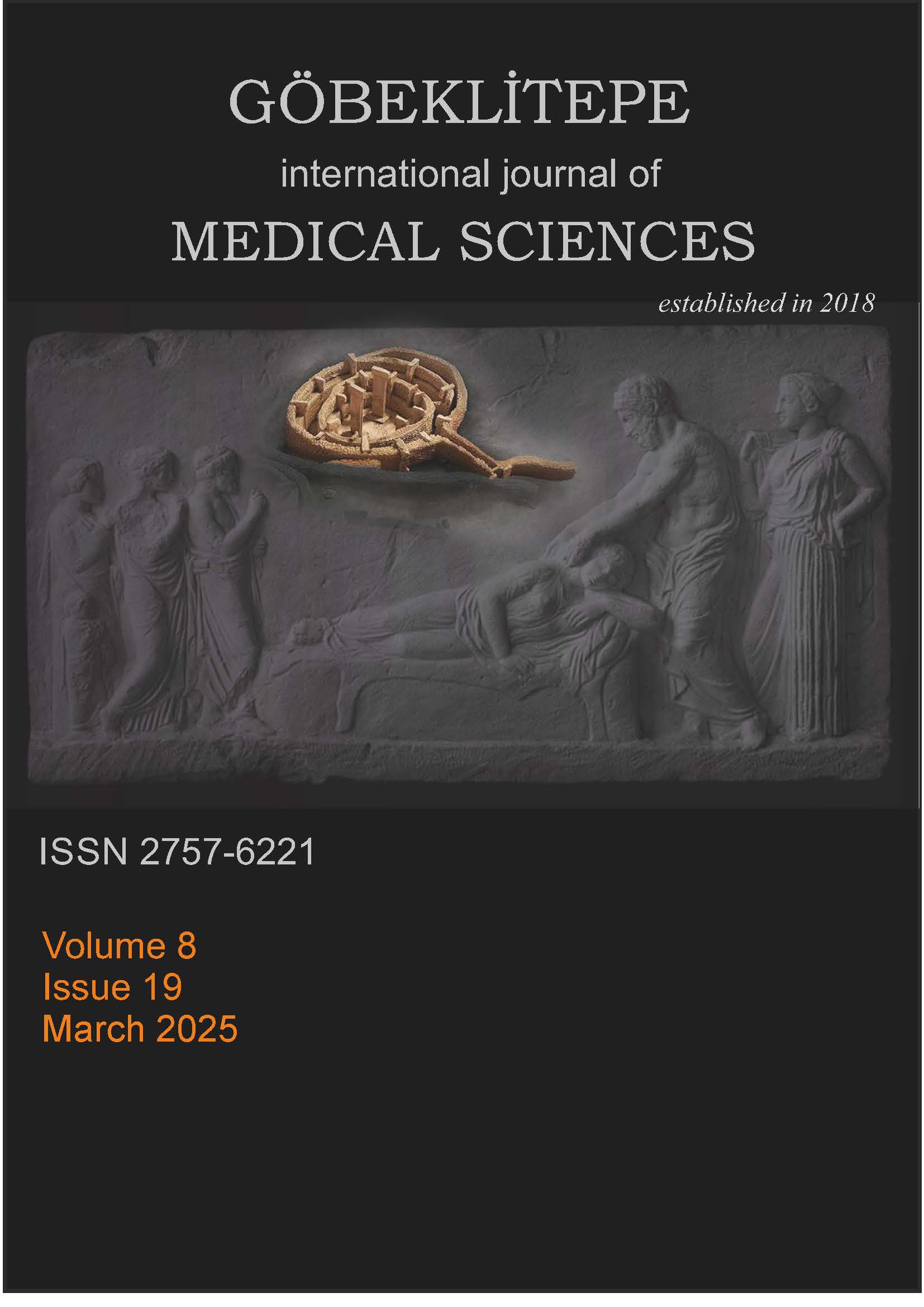THE RELATIONSHIP BETWEEN SELF-CARE POWER AND COMFORT LEVELS OF HEMODIALYSIS PATIENTS
Abstract
This study was conducted to examine the relationship between self-care power and comfort level of hemodialysis patients. The research data were collected between 15.04.2024-24.05.2024. Ethics committee and institutional permission were obtained before starting the study. All patients (n:83) receiving hemodialysis treatment in a state hospital were included in the study. The study was completed with 72 (86.74%) patients who met the inclusion criteria. Data were collected using the hemodialysis comfort scale and self-care power scale. The research data were analyzed in the statistical program. p<0.05 was considered statistically significant. The mean self-care power score of hemodialysis patients was 24.54±4.29 and the mean comfort scale score was 67.36±10.42. A statistically significant relationship was determined between the self-care power level of the patients and the variables of gender, marital status and treatment duration (p<0.05). A statistically significant relationship was determined between the comfort level of the patients and the variables of gender, marital status, family support during treatment and disease process, and treatment duration (p<0.05). There was a statistically significant positive correlation between the level of self-care power and comfort levels of the patients (p<0.05).In conclusion, self-care power and comfort concepts are affected by individual and environmental characteristics. The self-care level of the patients was determined to be low and the comfort level was determined to be moderate. As the self-care power of patients receiving hemodialysis treatment increases, their comfort levels also increase. In this direction
References
Karabey T, Karagözoğlu Ş. Hemodiyaliz sürecinde semptom yönetimi ve hemşirelik bakımı. Journal of TOGU Health Sciences, 2021;1(1):21-29.
Alemdar H, Çınar Pakyüz S. Hemodiyaliz hastalarında öz bakım gücünün yaşam kalitesine etkisinin değerlendirilmesi. Nefro Hem Dergi. 2015;10(2):19-30.
Muz G, Eğlence R. Hemodiyaliz uygulanan hastalarda öz bakım gücü ve öz yeterliliğin değerlendirilmesi. Balıkesir Sağlık Bilimleri Dergisi.2013; 2(1): 5-21.
World Health Organization. (2009). Self-care in the context of primary health care. Report of the Regional Consultation, 7–9 Jan 2009, Bangkok, Thailand, (pp. 17).
Kim H, Cho M.K. Factors ınfluencing self-care behavior and treatment adherence in hemodialysis patients. International journal of environmental research and public health,2021; 18(24): 12934. https://doi.org/10.3390/ijerph182412934
Choi, E.Y. Park, K.S. Lee, H.S. Factors affecting self-care performance in hemodialysis patients: based on the theory of unpleasant symptoms. J. Korea Converg. Soc. 2019, 10, 381–391.
Gülay T, Özdemir Eler Ç, Ökdem Ş, Akgün Çıtak E. Hemodiyaliz hastalarında konfor düzeyinin incelenmesi. HUHEMFAD. 2020;7(2):122-9.
Akça Kılıç N, Baykan S. The Relationship Between Pain and Comfort in Patients Receiving Hemodialysis. Journal of Nephrology Nursing. 2024; 19(2): 63-72.
Alkın Demir C, Özer Z. Hemodiyaliz tedavisi alan hastalarda semptom ve konfor ilişkisi/ the relationship of symptoms and comfort in patients receiving hemodialysis. NefroHemDergi. 2022;17(1):10-27.
Çalışkan T, Çınar PS. Hemodiyaliz tedavisi alan ve almayan üremik hastalarda kaşıntı konforu etkiler mi?. Türk Nefroloji, Diyaliz ve Transplantasyon Hemşireleri Derneği Nefroloji Hemşireliği Dergisi. 2019;14(3):84-96.
Oren B, Enc N: Development and psychometric testing of the self-care agency scale for patients undergoing long-term dialysis in Turkey. Journal of Renal Care 2014; 40:266-273
Orak NŞ, Pakyüz SÇ, Kartal A. Ölçek geliştirme çalışması: Hemodiyaliz hastalarında konfor. Nefroloji Hemşireliği Dergisi. 2017; 12(2): 68-77.
Türker E, Tanrıkulu G, Çelikten Ö. A study on the relationship between self-care agency and symptom management in hemodialysis patients. - Lokman Hekim Journal 2022; 12(3):668-674.
Ören, B. (2010). Hemodiyaliz ve periton diyalizi olan hastaların yaşam kalitesi ve öz-Bakım gücünü etkileyen faktörlerin incelenmesi, İstanbul Üniversitesi Sağlık Bilimleri Enstitüsü, Doktora Tezi, İstanbul.
Kurbun H, Metin Akten. Hemodiyaliz hastalarında öz-bakım gücü ve yaşam kalitesinin değerlendirilmesi. Turk Neph Dial Transpl 2018; 27 (3): 277-287.
Karakurt P, Hacıhasanoğlu Aşılar R, Yıldırım A. Diyabetli hastalarin öz-bakim gücü ve algiladiklari sosyal desteğin değerlendirilmesi. ADÜ Tıp Fakültesi Dergisi 2013;14(1) :1 – 9.
Güzel EN, Koç A. Sosyal destek kalp yetersizliği olan hastalarda öz bakım davranışını etkiler mi? Tanımlayıcı Bir Araştırma. Kardiyovasküler Hemşirelik Dergisi. 2024;15(37):97-103. doi:10.5543/khd.2024.72473.
Akyol Durmaz A, Karadakovan A. Hemodiyalize giren hastaların yaşam kalitesi ve öz bakım gücü ile bunlar üzerine etkili değişkenlerin incelenmesi. Ege Tıp Dergisi 2002;41(2): 97 – 102
Usta Yeşilbalkan Ö, Karadakovan A. Periton diyalizi hastalarının genel öz yeterlilikleri. Nefroloji Hemşireliği Derneği Dergisi 2005,Mart-Haziran; 39-44.
Akça Kılıç N, Baykan S. The relationship between pain and comfort in patients receiving hemodialysis. Nefroloji Hemşireliği Dergisi 2024;19(2): 63-72.
Çalışkan T, Çınar Pakyüz S. Hemodiyaliz tedavisi alan ve almayan üremik hastalarda Kaşıntı Konforu Etkiler mi?. NefroHemDergi. 2019;14(3):84-96.
Özdemir Ö. Postdialysis fatigue and comfort levels of patients receiving hemodialysis treatment. Bandırma Onyedi Eylül Üniversitesi Sağlık Bilimleri ve Araştırmaları Dergisi. August 2024;6(2):356-365. doi:10.46413/boneyusbad.1439000
Gülhan Güner S, Pehlivan Köksal Z., Sandıkçıoğlu Şükran, Nural N. Comfort level of patients receiving hemodialysis treatment and affecting factors: Descriptive and cross-sectional study: Hemodiyaliz hastalarında konfor Göbeklitepe Sağlık Bilimleri Dergisi. 2024; 7(16):57-66.
Albert NM, Cohen B, Liu X, Best CH, Aspinwall L, Pratt L. Hospital nurses' comfort in and frequency of delivering heart failure self-care education. Eur J Cardiovasc Nurs. 2015;14(5):431-440. doi:10.1177/1474515114540756
Karabulutlu Yılmaz E, Karasu Ş. Evaluation of anxiety, adaptation to the disease and self-care management of patients receiving hemodialysis treatment during the COVID-19 pandemic process. 2024, 7(1), 10-22.
Downloads
Published
Versions
- 2025-07-23 (4)
- 2025-03-28 (3)
- 2025-03-26 (2)
- 2025-03-26 (1)
How to Cite
Issue
Section
License
Copyright (c) 2025 Göbeklitepe Medical Science Journal

This work is licensed under a Creative Commons Attribution 4.0 International License.




